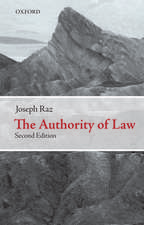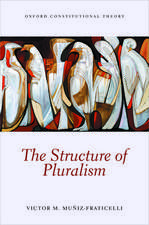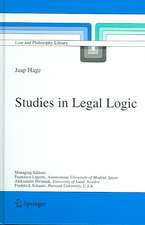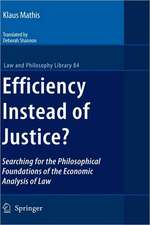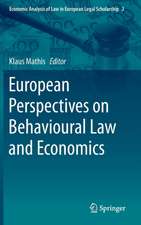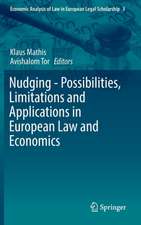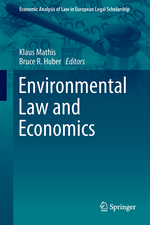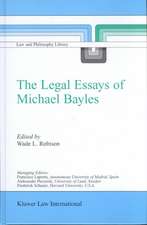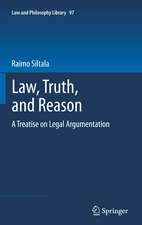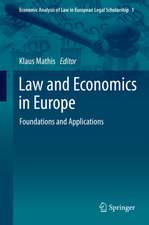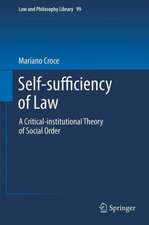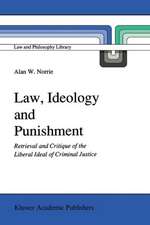Efficiency, Sustainability, and Justice to Future Generations: Law and Philosophy Library, cartea 98
Editat de Klaus Mathisen Limba Engleză Paperback – 27 noi 2013
A key requirement of sustainable development is justice to future generations. It is still a matter of fact that the law as well as the theories of justice are generally restricted to the resolution of conflicts between contemporaries and between people living in the same country. This in turn raises a number of questions: what is the philosophical justification for intergenerational justice? What bearing does sustainability have on the efficiency principle? How do we put a policy of sustainability into practice, and what is the role of the law in doing so?
The present volume is devoted to these questions. In Part One, “Law and Economics”, the role of economic analysis and efficiency in law is examined more closely. Part Two, “Law and Sustainability”, engages with the themes of sustainable development and justice to future generations. Finally, Part Three, “Law, Economics and Sustainability”, addresses the interrelationships between the different aspects.
| Toate formatele și edițiile | Preț | Express |
|---|---|---|
| Paperback (1) | 942.94 lei 6-8 săpt. | |
| SPRINGER NETHERLANDS – 27 noi 2013 | 942.94 lei 6-8 săpt. | |
| Hardback (1) | 946.55 lei 6-8 săpt. | |
| SPRINGER NETHERLANDS – 13 aug 2011 | 946.55 lei 6-8 săpt. |
Din seria Law and Philosophy Library
- 20%
 Preț: 813.10 lei
Preț: 813.10 lei - 20%
 Preț: 569.00 lei
Preț: 569.00 lei - 18%
 Preț: 1225.16 lei
Preț: 1225.16 lei - 18%
 Preț: 950.66 lei
Preț: 950.66 lei - 15%
 Preț: 583.43 lei
Preț: 583.43 lei - 15%
 Preț: 639.25 lei
Preț: 639.25 lei - 15%
 Preț: 641.53 lei
Preț: 641.53 lei - 18%
 Preț: 893.84 lei
Preț: 893.84 lei - 24%
 Preț: 797.37 lei
Preț: 797.37 lei - 15%
 Preț: 579.84 lei
Preț: 579.84 lei - 15%
 Preț: 644.95 lei
Preț: 644.95 lei - 18%
 Preț: 895.76 lei
Preț: 895.76 lei - 15%
 Preț: 644.95 lei
Preț: 644.95 lei - 20%
 Preț: 571.84 lei
Preț: 571.84 lei - 15%
 Preț: 642.03 lei
Preț: 642.03 lei - 18%
 Preț: 1232.26 lei
Preț: 1232.26 lei - 18%
 Preț: 1116.05 lei
Preț: 1116.05 lei - 15%
 Preț: 655.92 lei
Preț: 655.92 lei - 18%
 Preț: 833.54 lei
Preț: 833.54 lei - 18%
 Preț: 898.26 lei
Preț: 898.26 lei - 18%
 Preț: 1016.63 lei
Preț: 1016.63 lei -
 Preț: 390.25 lei
Preț: 390.25 lei - 24%
 Preț: 700.88 lei
Preț: 700.88 lei - 18%
 Preț: 999.60 lei
Preț: 999.60 lei - 18%
 Preț: 1115.77 lei
Preț: 1115.77 lei - 18%
 Preț: 1107.88 lei
Preț: 1107.88 lei - 15%
 Preț: 637.46 lei
Preț: 637.46 lei - 18%
 Preț: 781.94 lei
Preț: 781.94 lei - 24%
 Preț: 815.51 lei
Preț: 815.51 lei - 18%
 Preț: 786.18 lei
Preț: 786.18 lei - 18%
 Preț: 735.21 lei
Preț: 735.21 lei - 15%
 Preț: 653.33 lei
Preț: 653.33 lei - 18%
 Preț: 782.10 lei
Preț: 782.10 lei
Preț: 942.94 lei
Preț vechi: 1149.93 lei
-18% Nou
Puncte Express: 1414
Preț estimativ în valută:
180.43€ • 188.89$ • 149.29£
180.43€ • 188.89$ • 149.29£
Carte tipărită la comandă
Livrare economică 05-19 aprilie
Preluare comenzi: 021 569.72.76
Specificații
ISBN-13: 9789400737686
ISBN-10: 9400737688
Pagini: 260
Ilustrații: XX, 240 p.
Dimensiuni: 155 x 235 x 14 mm
Greutate: 0.37 kg
Ediția:2012
Editura: SPRINGER NETHERLANDS
Colecția Springer
Seria Law and Philosophy Library
Locul publicării:Dordrecht, Netherlands
ISBN-10: 9400737688
Pagini: 260
Ilustrații: XX, 240 p.
Dimensiuni: 155 x 235 x 14 mm
Greutate: 0.37 kg
Ediția:2012
Editura: SPRINGER NETHERLANDS
Colecția Springer
Seria Law and Philosophy Library
Locul publicării:Dordrecht, Netherlands
Public țintă
ResearchCuprins
Preface.- Authors.- Introduction.- Part I: Law and Economics.- Consequentialism in Law; Klaus Mathis.- Consequence-based Arguments in Legal Reasoning: a Jurisprudential Preface to Law and Economics; Péter Cserne.- Is the Rationality of Judicial Judgements Jeopardized by Cognitive Biases and Empathy? Klaus Mathis and Fabian Diriwächter.- Part II: Law and Sustainability.- Our Responsibility towards Future Generations; Paolo Becchi.- Future Generations in John Rawls’ Theory of Justice; Klaus Mathis.- What Is It Like to Be Unborn? Our Common Fate with Future Generations; Malte-Christian Gruber.- Cultural Heritage Preservation and Socio-environmental Sustainability: Sustainable Development, Human Rights and Citizenship Milena Petters Melo.- Part III: Law, Economics, and Sustainability.- Discounting the Future? Cost-Benefit Analysis and Sustainability; Klaus Mathis.- A Critical Review of “Efficiency Ethics”: the Case of Climate Economics; Felix Ekardt.- Valuing the Invaluable? Valuation of Human Life in Cost-Efficiency Assessments of Regulatory Interventions; Balz Hammer.
Textul de pe ultima copertă
Fifty years after the famous essay “The Problem of Social Cost” (1960) by the Nobel laureate Ronald Coase, Law and Economics seems to have become the lingua franca of American jurisprudence, and although its influence on European jurisprudence is only moderate by comparison, it has also gained popularity in Europe. A highly influential publication of a different nature was the Brundtland Report (1987), which extended the concept of sustainability from forestry to the whole of the economy and society. According to this report, development is sustainable when it “meets the needs of the present without compromising the ability of future generations to meet their own needs”.
A key requirement of sustainable development is justice to future generations. It is still a matter of fact that the law as well as the theories of justice are generally restricted to the resolution of conflicts between contemporaries and between people living in the same country. This in turn raises a number of questions: what is the philosophical justification for intergenerational justice? What bearing does sustainability have on the efficiency principle? How do we put a policy of sustainability into practice, and what is the role of the law in doing so?
The present volume is devoted to these questions. In Part One, “Law and Economics”, the role of economic analysis and efficiency in law is examined more closely. Part Two, “Law and Sustainability”, engages with the themes of sustainable development and justice to future generations. Finally, Part Three, “Law, Economics and Sustainability”, addresses the interrelationships between the different aspects.
A key requirement of sustainable development is justice to future generations. It is still a matter of fact that the law as well as the theories of justice are generally restricted to the resolution of conflicts between contemporaries and between people living in the same country. This in turn raises a number of questions: what is the philosophical justification for intergenerational justice? What bearing does sustainability have on the efficiency principle? How do we put a policy of sustainability into practice, and what is the role of the law in doing so?
The present volume is devoted to these questions. In Part One, “Law and Economics”, the role of economic analysis and efficiency in law is examined more closely. Part Two, “Law and Sustainability”, engages with the themes of sustainable development and justice to future generations. Finally, Part Three, “Law, Economics and Sustainability”, addresses the interrelationships between the different aspects.
Caracteristici
Combines research from three disciplines: law, philosophy and economics Covers the hot topics of climate change, sustainability, and eco-justice Puts future generations at the forefront Investigates the key requirement of sustainable development



